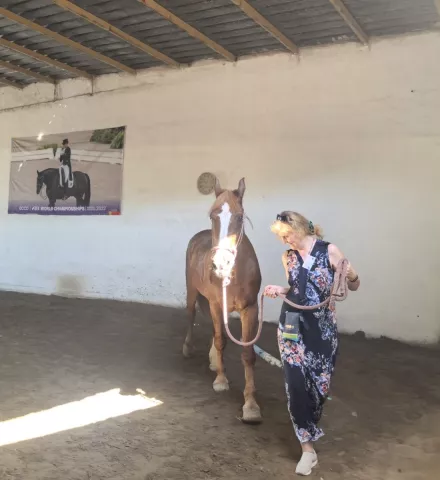
As an “old-school” university teacher trying to keep an open mind, I enrolled in the “ICT in Outdoor & Adventure Inclusive Education” program, organized by the University of Crete, with a healthy dose of skepticism and a lot of curiosity.
The Erasmus+ KA1 program was held in Heraklion, Greece, from 21 to 25 July 2025. The venue was an excellent choice: a park outside the city with thousand-year old olive trees, a replica of the Minoan theatre at Knossos, a horse-riding school, and an exhibition showcasing traditional bread-making methods — a perfect setting for tuning the trainees into the spirit of the program. Additionally, the participants had the unique experience of immersing themselves into Cretan-Minoan culture through a guided tour of the Knossos Palace, an ancient-themed ballet performance, and a tasty exploration of Minoan eating habits.
As for the training itself, it comprised traditional brainstorming, teamwork, and avalanche techniques, with the objective of teaching through practice and reflection, while minimizing purely theoretical input. The emphasis of the program was placed on using AI as a teaching resource, with a detailed analysis of its advantages and limitations. To enhance our engagement in outdoor adventure learning, we were introduced to apps like PlantNet, Merlin Bird ID, ActionBound, and Quiver, as well as to the possibilities of using AI and Canva to plan outdoor lessons and adapt them for students with different needs.
For my part, I would say that the course content helped me organize my scattered knowledge of ICT, acquired along the way, while filling in some gaps that existed due to the lack of a systematic approach to this field. However, since my idiosyncrasy — both as a teacher and as a person — is not easily tempted by rapidly developing tech gadgets, I was more impressed and deeply inspired by the two workshops aimed at sensitizing and fine-tuning us to the teacher-student relationship and the development of soft skills: namely, the equestrian and the Linear B workshops. The first one offered a new perspective on the teaching process by highlighting the similarities between humans and horses. As it turns out, both learn when drawn out of their comfort zones and need freedom, respect, and guidance simultaneously. As for the second creative activity — writing with sticks on clay tablets in one of the oldest scripts in the world — not only did I thoroughly enjoy becoming a student and learning while having fun, but I was reassured that total digitization is not necessarily the future of education, and that the “old ways” and the new ones can peacefully coexist if the teacher learns how to skillfully promote them.
Summing up and reflecting upon the five-day training program in using ICT in Outdoor & Adventure Inclusive Education, I would say that my skepticism remains. Do the plant and animal identification apps — fascinating as they are — truly connect children to nature? Do AI and Canva genuinely foster creativity in educators by offering all kinds of mind-blowing suggestions, so that the latter only need to select, pick, and perhaps slightly adapt their ideas? My personal answer is negative, but I believe every teacher should find his or her own path through the ever-accelerating technologies invading our world — especially that of the younger generations.
Twenty years after I prepared my first lesson plan using a pen and a notepad and relying entirely on my own intellectual and inspirational resources, I produced my first electronic lesson plan with the help of Canva and Copilot. Although I can't deny the utility of the enormous amount of information, activity ideas, and countless possibilities for modification generously put at my disposal, I still prefer my old-fashioned pen-and-notebook method. But then I realize that it is easy for me to keep my collaboration with AI to a minimum because I work with small groups and very seldom with students with special needs, which makes my lessons relatively easy to tailor. Perhaps colleagues who face greater challenges will benefit more from ICT, especially if outdoor and adventure learning is on the agenda of their institutions. Therefore I would highly recommend similar training courses to every educator — from the high-tech enthusiast to the “old-school” skeptic like me — because they provide a wonderful opportunity to reassess and update our learning and teaching experiences, to keep up with innovations that inevitably make their way into classrooms, and ultimately to integrate the very best of these innovations into our teaching and learning styles.
Dr. Mariya Hristova
Chief Assistant Professor
South-West University “Neofit Rilski,” Bulgaria